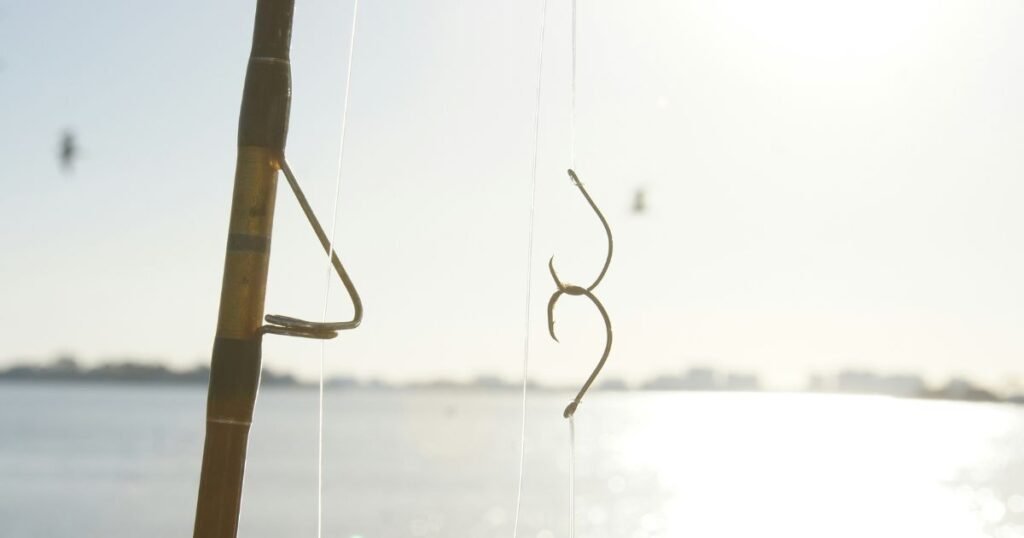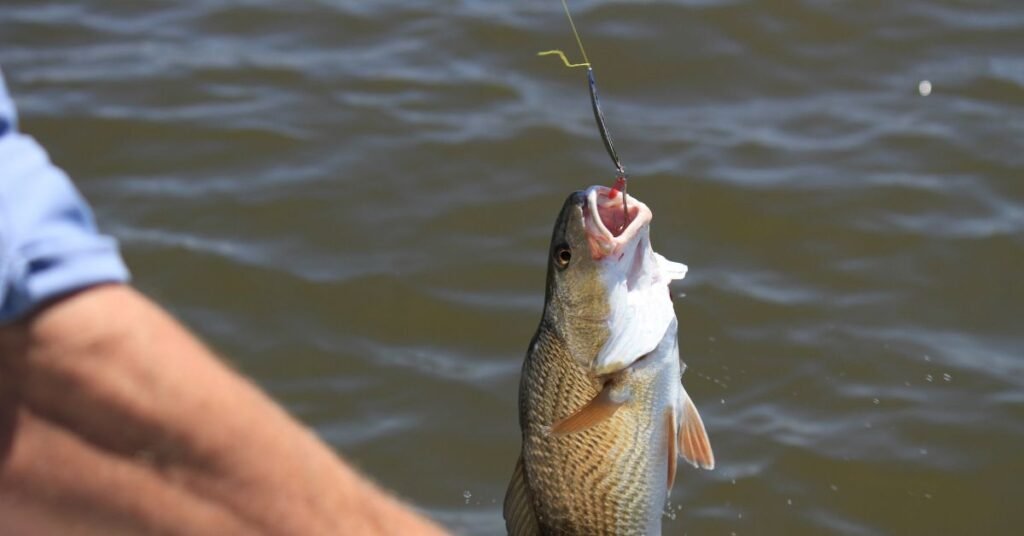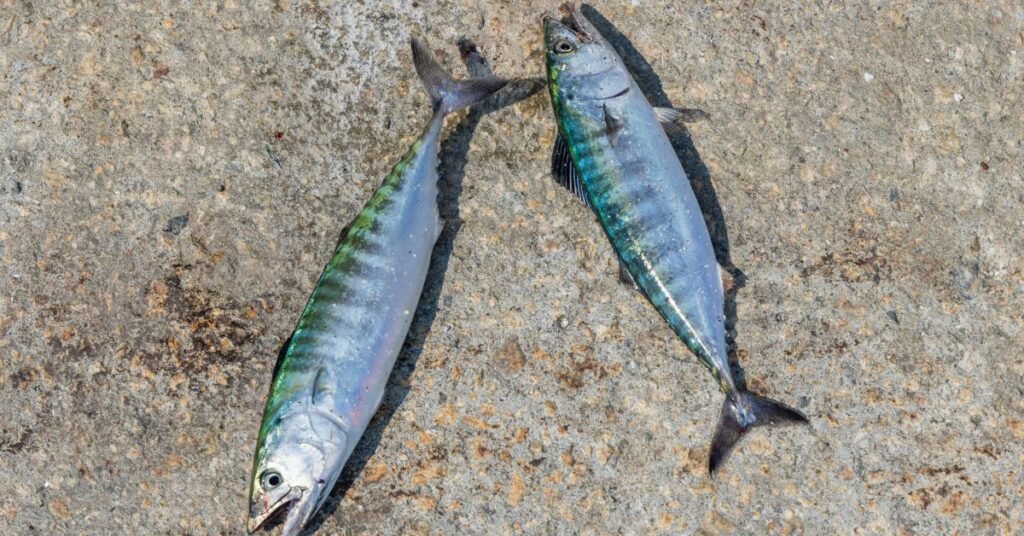A fishing hook, historically known as a hook. It pierces the fish’s mouth to catch them. The design and function of fishing hooks have evolved over the millennia. Fishermen have been using fish hooks for thousands of years to catch both freshwater and saltwater fish.
They might look simple, but they play a huge role in fishing. A hook holds all kinds of bait—live worms, dead fish, processed dough, even fancy artificial stuff. If you’re bait fishing, it’s your main tool. If you’re using a lure, the hook helps mimic insects, shrimp, or other prey. Either way, it’s all about triggering that instinct in the fish to bite.
Hooks come in tons of shapes and sizes. Some are tiny for catching bluegill. Others are big enough to land a monster catfish. Your choice depends on what you’re fishing for and how you plan to catch it.
You’ll usually tie the hook to your fishing line. Then you add bait or a lure to tempt the fish into biting and, hopefully, swallowing the hook. The goal? To get them to bite naturally, without a second thought.
In today’s blog post, I will tell you about the most popular types of fishing hooks, when to use them, and how to pick the right size.
Table of Contents
How to Choose the Right Fishing Hooks
Fishing hooks are an important tool for any angler. Choosing the right type of hook is crucial to your fishing success. Choosing the right fishing hook is critical to successful angling. It’s not just a tiny piece of metal. The hook you pick can change everything. It decides what kind of fish you’re able to catch. It also affects how often you get bites.
I’ve learned this the hard way. I once used a hook that was way too big while trying to catch trout. Spoiler alert: I went home empty-handed.
Fishing hooks are one of the smallest parts of an angler’s setup. But fishing hooks are the most important step in fishing. But there are as many types of fishing hooks as there are fish to catch with them. Here is a summary table of key factors in choosing a fishing hook.
| Factor | Considerations |
| Hook Type | J-hook, circle, treble, specialty (weedless, offset, etc.) |
| Hook Size | Match to bait and target species; understand sizing system |
| Hook Point & Barb | Spear, needle, rolled-in, hollow, knife-edge; barbed/barbless |
| Tackle Strength | Match hook strength to rod, reel, and line |
| Fishing Technique | Bait, lure, fly, or specialty methods |
| Environment | Water clarity, structure, and local species |
Fishing hooks
Each part of a fishing hook has a different name. Here’s a brief breakdown of each:
- Eyes: The back loop is attached to the line.
- Shank: The straight part connecting the eye with the bend, but blunt at the end.
- Bend: The curved part where the hook turns back on itself.
- Barb: A small backward-facing spike that prevents the hook from coming loose from the fish’s mouth.
- Point: A sharp and pointed edge designed to pierce the mouth of a fish.
Types of Hooks
Single hook: The most common type, but versatile for several reasons. Used with live bait or lures. It is available in sizes from small trout hooks to large saltwater hooks.
Circle hook: It is designed to hook the fish in the corner of the mouth. Reducing gut hooking and reducing the survival rate of released fish. Circle hooks are popular among catch-and-release anglers. This fishing hook is usually used for live bait fishing.
Treble hooks: This increases the chances of a hookup, but can be difficult to remove. Often, these hooks are used for species like bass and pike.
Jig Hooks: The eye is set at right angles to increase the speed of the lure in the water. The jig hook is perfect for a variety of fishing styles. These hooks are adapted for catch-and-release by breaking or filing the barb.
Weedless Hook: This is popular with anglers. They are used for fishing in heavy cover in the vegetation. Weedless hooks have a thin guard that clips onto the point. This hook is set lightly enough that it will snap off as soon as a fish takes your bait.
Siwash Hooks: These hooks are easy to remove and less harmful to fish. It has long lips and open eyelids for easy attachment. Siwash hooks are popular for their sharpness and strength. This hook is perfect for targeting larger fish like salmon and steelhead. It has lips and points so that they close the lure naturally and don’t come out once set.
Fishing Hooks Size
Finding the right size hook is important before fishing. Fishing hooks are essential tools for anglers and crucial to successful fishing. Manufacturers identify hooks by numbers and a term called “out” (pronounced “accent”). The sizing system can be confusing for beginners. Numbered hooks range from 32 (smallest) to 1 (largest). Higher numbers on this scale mean smaller hooks. After Aught Hooks size 1, the sizing switches to Aught. It starts at 1/0 and increases to 20/0. A larger number on this scale indicates a larger hook size.
Fishing hook size chart
| Size | Length (mm) | Length (inches) | Common Use |
| #32 | 5 mm | 0.20″ | Small flies |
| #30 | 6 mm | 0.24″ | Small flies |
| #28 | 7mm | 0.28″ | Small bait |
| #26 | 8mm | 0.31″ | Small bait |
| #24 | 9mm | 0.35″ | Small bait |
| #22 | 10mm | 0.39″ | Small bait |
| #20 | 11mm | 0.43″ | Small bait |
| #18 | 12mm | 0.47″ | Panfish |
| #16 | 13mm | 0.51″ | Trout |
| #14 | 14mm | 0.55″ | Trout |
| #12 | 15mm | 0.59″ | Bass |
| #10 | 16mm | 0.63″ | Bass |
| #8 | 17mm | 0.67″ | Walleye |
| #6 | 18mm | 0.71″ | Large bass |
| #4 | 19mm | 0.75″ | Catfish |
| #2 | 22mm | 0.86″ | Catfish |
| #1 | 25mm | 0.98″ | Large catfish |
| 1/0 | 34 mm | 1.33″ | Large bass or small pike |
| 2/0 | 39 mm | 1.53″ | Large bass or pike |
| 3/0 | 42 mm | 1.65″ | Large pike or catfish |
| 4/0 | 47 mm | 1.85″ | Trophy catfish or large pike |
| 5/0 | 52 mm | 2.04″ | Large saltwater species |
| 6/0 | 59 mm | 2.32″ | Large saltwater species |
| 7/0 | 65 mm | 2.56″ | Large saltwater species |
| 8/0 | 72 mm | 2.83″ | Large saltwater species |
| 9/0 | 78 mm | 3.07″ | Large saltwater species |
| 10/0 | 90 mm | 3.54″ | Large game fish |
5 Best Fishing Hooks for Beginner Anglers
The first thing you need to know about fishing is the right fishing hook. The right fishing hook will help you catch the right fish. Here are the five best types of fishing hooks for novice anglers:
1. Circle Hook
Circle Hook is suitable for beginners. This hook gets stuck in the corner of the fish’s mouth. This hook is easy to set and causes less damage to the fish. This hook sets easily and causes less damage to the fish. You just need to reel in—no aggressive hook set needed. This hook is more commonly used for catching species like carp and pike.
2. Aberdeen Hooks
Aberdeen hooks are lightweight, with a long shank and narrow gap, used to catch small fish such as panfish and crappie. The thin wire reduces damage to live bait and keeps it alive for a long time. These baits can be easily bent if they get stuck. This helps in thickets or stagnant water.
For small fish, this bait is usually used in sizes from number 8 to number 1.
3. Wide Gape Hook
Another popular fishhook for new anglers is the wide-gape hook. It has a wide gap between the shank and the point. It provides a strong hook hold. Anglers use it to catch large fish like carp.
4. Long Shank Hooks
Anglers use long-shank hooks for bottom baits and carp rigs. This makes it easier to remove the long-shank hook. It is often used on specialized rigs to increase hooking efficiency. This makes fishing easier for beginners.
5. J-Hooks
Another popular fishhook used by beginners is the J-hook, or bait holder hook. These are simple and versatile hooks. Beginners typically use them. They often have small barbs on the shank to hold the bait securely. They are suitable for both live and cut bait. This hook is easy to use with common baits like worms, corn, or dibble.
This selection balances ease of use, versatility, and effectiveness, making these hooks ideal for anglers just starting out.
How to Attach Hooks to Nylon?
If you are a new angler to the world of fishing, you will need to master this basic skill of attaching a fishing hook to a nylon (monofilament) line.

Here are some simple and reliable methods for safely tying hooks to nylon:
1. Advanced Clinch Knot
One of the most popular and reliable knots for attaching hooks to nylon lines is the advanced clinch knot. For this knot, you first need to pass the tag end of the nylon line through the eye of the hook. Wrap the tag end around the standing line five times.
Bring the tag end back through the loop closest to the hook eye. Moisten the knot to reduce friction and help the knot seat properly. You can use saliva or water if necessary. Pull the tag end to tighten the knot against the hook. Finally, after tying the knot, cut off the excess tag end, leaving 1/8 inch. Then your knot is ready.
2. Palomar Knot
The Palomar knot is a strong knot for both monofilament and braided lines. To make this knot, you first need to double about 6 inches of nylon line and pass the loop through the eye of the hook. Next, tie a loose overhand knot with the double line. After tying the knot, pass the hook through the loop. Then, wet the knot. Once the knot is wet, pull both the standing line and the tag end to tighten it. Finally, trim the excess line as in the previous knot.
3. Loop-to-Loop Method
If you are using a pre-tied hook with a loop on the end (a nylon hook), you can use this quick method. First, you need to tie a loop to the end of your mainline (a figure-of-eight loop is common). Then take the loop on the hook length (with the nylon attached to the hook). At the same time, pass it over the mainline loop. Then pass the hook through the mainline loop. Pull both loops tight. This securely attaches the hook length to the mainline and allows for easy swapping.
Eyes
A fishing hook eye is a small loop at the end of a hook shank. The fishing hook eye forms a small loop at the end of the hook shank. Anglers attach the fishing line here. Here are the main types of fishing hook eyes and their common uses:
Ringed Eye: Circular loop, most common type. The end sits flush against the shank. Versatile, suitable for most fishing applications and knots.
Up Eye: The eye angles upward from the shank. Ideal for Snell knots. Often used in fly fishing and for certain bait presentations.
Down Eye: The eye points downward or parallel to the shank. Preferred for specific hook positioning, especially when dragging bait or using Snell knots.
Big Eye: Larger than normal eye. Accommodates heavier lines and easier knot tying for thick lines.
Cross Eye: The Eye is at a 90-degree angle to the shank. Enables vertical fishing; good for soft plastics or live bait.
Open Eye: The Eye is not fully closed, leaving a gap. Allows quick attachment to lures; often used to replace treble hooks with singles.
Side Eye: The eye sits to the side of the shank. Useful for horizontal bait or lure presentations.
Brazed Eye: Manufacturers weld or braze the eye shut. Provides extra strength for heavy lines and large game fish.
Looped Eye: Elongated loop, often parallel to the shank. Common in fly fishing, especially for dry flies.
Needle Eye: Narrow, slit-like eye resembling a sewing needle. Often used in saltwater fishing and for threading bait.
Tapered Eye: Eye tapers to a point, thinner than the shank. Frequently found on hooks for dry flies.
Choosing the right hook eye type is crucial for optimizing knot security, bait presentation, and fishing success. The best choice depends on your target species, fishing technique, and the type of line and bait you use. Experimenting with different eye designs can help you find what works best for your fishing style.
Final Thought
There are so many types, sizes, and styles. Then throw in things like hook eyes and materials, and your head starts spinning. But here’s the deal: understanding the basics makes a big difference out on the water.
When you choose the right hook, your bait looks more natural. Fish bite more often. And guess what? You land more of them. That’s the kind of day every angler wants: less frustration, more fish, and way more enjoyment.



